英语非谓语动词用法全面归纳【没有最全,只有更全】
英语非谓语动词用法总结

千里之行,始于足下。
英语非谓语动词用法总结非谓语动词是英语中一种特殊的动词形式,它们没有主语,也没有时态的变化。
非谓语动词分为不定式、分词和动名词三种形式。
它们在句子中可以充当动词、形容词或名词的作用,用来修饰或补充主句的内容。
非谓语动词用法灵活多样,可以用在主句的前面、后面或中间位置,并且可以与其他成分同时存在于一个句子中。
在本文中,我将总结非谓语动词的用法,并给出一些例子来帮助理解。
一、不定式(infinitive)1. 不定式作主语e.g. To learn English is my goal. 学英语是我的目标。
2. 不定式作宾语a) 动词后直接接不定式作宾语e.g. I want to go to the cinema. 我想去电影院。
b) 动词后接代词(宾格)+不定式作宾语e.g. She advised me not to buy that car. 她建议我不要买那辆车。
3. 不定式作宾语补足语e.g. I found it hard to understand his accent. 我发现很难理解他的口音。
4. 不定式用来表示目的e.g. I went to the library to borrow some books. 我去图书馆借书。
5. 不定式用来表示结果第1页/共3页锲而不舍,金石可镂。
e.g. She was too tired to continue working. 她太累了,无法继续工作。
6. 不定式用来表示原因e.g. He called me to apologize. 他打电话给我道歉。
7. 不定式用来表示方式e.g. She danced gracefully to the music. 她优雅地随着音乐跳舞。
二、分词(participle)1. 现在分词(-ing形式)a) 分词作定语,修饰名词e.g. The running dog is mine. 那只奔跑的狗是我的。
非谓语动词讲解(超全超实用)
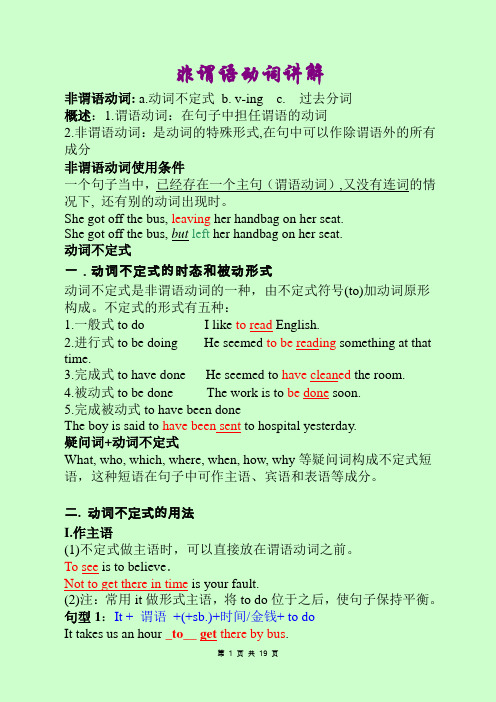
非谓语动词讲解非谓语动词: a.动词不定式 b. v-ing c. 过去分词概述:1.谓语动词:在句子中担任谓语的动词2.非谓语动词:是动词的特殊形式,在句中可以作除谓语外的所有成分非谓语动词使用条件一个句子当中,已经存在一个主句(谓语动词),又没有连词的情况下, 还有别的动词出现时。
She got off the bus, leaving her handbag on her seat.She got off the bus, but left her handbag on her seat.动词不定式一.动词不定式的时态和被动形式动词不定式是非谓语动词的一种,由不定式符号(to)加动词原形构成。
不定式的形式有五种:1.一般式to do I like to read English.2.进行式to be doing He seemed to be reading something at that time.3.完成式to have done He seemed to have cleaned the room.4.被动式to be done The work is to be done soon.5.完成被动式to have been doneThe boy is said to have been sent to hospital yesterday.疑问词+动词不定式What, who, which, where, when, how, why等疑问词构成不定式短语,这种短语在句子中可作主语、宾语和表语等成分。
二. 动词不定式的用法I.作主语(1)不定式做主语时,可以直接放在谓语动词之前。
To see is to believe.Not to get there in time is your fault.(2)注:常用it做形式主语,将to do位于之后,使句子保持平衡。
句型1:It + 谓语+(+sb.)+时间/金钱+ to doIt takes us an hour _to__ get there by bus.It costs you only $ 100 a month to cook at home.It seemed impossible to save money.句型2:I t’s + n. (+ for sb) + to doIt’s our duty _to_ help the poor.It is a great enjoyment _to_ spend our holiday in the countryside..It is a great honor for us to be present at your birthday party.句型3:It is + adj (+ for sb)to do sth(是形容事物的性质的)It is + adj (+ of sb)to do sth(是形容人的品质的)It is easy for me to finish this work before ten.It is very kind of you to give me some help.It's impolite of you to speak to the teacher like that.疑问词+不定式作主语When to start remains undecided.1.It is easy to get there by bus or taxi.2. It takes about 3 hours to see all the birds.3. It is also impolite to speak with your mouth full when you are eating.4. It’s our duty to take good care of the old.5. How long did it take you to finish the work?6. It is stupid of you to write down everything the teacher says.7. When to start has not been decided.8. It seemed selfish of him not to give them anything.9. It’s necessary for you to lock the car when you do not use it.10. It is useful for our health to do morning exercises.II.作宾语接不定式做宾语I want to know this matter.I don’t expect to meet you here(1)常见动词有:like, demand, expect, promise, begin, determine, refuse, fail, manage, learn, seem, forget, want, prepare, pretend, plan, wish等They want to get_( get ) on the bus, didn’t they?He said he wished __to be ( be ) a professor.(2)it作形式宾语I find/feel to work with him interesting .I find/feel it interesting to work with him.Subject+ find/think/feel/make/ consider… it+adj/n + to do sth.1.We thought _it__ better __to_ start early.2.Do you consider _it__ better not _to_ go?3. I feel _it_ my duty _to_ change all that.4.We think it __ important _ to _ obey the law.5.I know _ it _ impossible _ to _ finish so much homework in a day.(3)疑问词+不定式作宾语常常放在这些动词的后面作宾语:tell, advise, show, teach, find out, decide, discuss, learn, explain…He taught us how to use the tool.No one could tell me where to get the book.The dictionary didn’t tell the Frenchman how to pronounce the word.(4) 作介词but, except, besides的宾语。
非谓语动词用法总结

非谓语动词用法总结非谓语动词是历年高考英语的重要考点之一,同时也是较难掌握的难点之一。
它贯穿于英语学习和考试过程的始终。
但是,只要认真分析、透彻理解、看透本质、准确把握,就一定能在高考中运筹帷幄,游刃有余。
一.非谓语动词区别简表二.不定式的用法不定式不可作谓语,但它可以有自己的宾语、状语,构成不定式短语,在句中可以作主语、宾语、表语、定语(表用途)、状语或补足语。
高考对不定式的考查主要有不定式的时态、语态、作用、否定、省略、连词+不定式等。
作主语不定式作主语表示具体的动作,通常指一件已知的事或目的。
不定式作主语时,谓语动词用单数。
eg:To say is a thing,to do is another.(说是一回事,做是另外一回事。
)(2)不定式短语较长时,通常放在谓语之后,用it作形式主语。
eg:①It is important to learn English well.(学好英语是重要的。
)②It is necessary for us to do the job well.(我们做好这项工作是必要的。
)③It is a great honor to be invited to give a speech here.(被邀请在这儿发表演讲是一个极大的荣幸。
)2.作宾语(1)常只用不定式作宾语的动词有:want,wish,hope,long,expect,desire,intend,decid e,ask,promise,aim,offer,agree,plan,learn,choos e,refuse,fail,manage,pretend等。
eg:①He refused to help me.(他拒绝帮助我.)②She has agreed to come tomorrow.(他已同意明天来.)(2) 不定式较长时,作宾语,也可用it代替,放在后面。
eg;I find it difficult to do the job well.(3) “特殊疑问词﹢不定式to do结构”具有名词特征,可作宾语。
非谓语动词用法总结

非谓语动词用法总结非谓语动词作主语一.动词不定式作主语1.不定式作主语表示具体的动作,通常指一件已知的事或目的。
不定式作主语时,谓语动词用单数。
To say is a thing,to do is another.(说是一回事,做是另外一回事。
)2. 不定式短语较长时,通常放在谓语之后,用it作形式主语。
①It is important to learn English well.(学好英语是重要的。
)②It is necessary for us to do the job well.(我们做好这项工作是必要的。
)③It is a great honor to be invited to give a speech here.(被邀请在这儿发表演讲是一个极大的荣幸。
)二.动词ing不定式作主语1.动名词做主语往往表示经常性、习惯性的动作或状态。
Watching news on TV has become a routine for me.(经常性、习惯性的动作)Talking is easier than doing.(状态)(1)动名词直接置于句首。
Talking is easier than doing.(2).Ving 形式作主语时常后置,用it作形式主语Playing video games is a waste of timeIt is a waste of time playing video games常见句式:It is no good/no use/ useless doing sth 做...没有用的It is a waste of time doing sth做...是浪费时间的(3).There be 结构中作主语:A. There is no+doing 表示不可能做某事There is no knowing the future ==we can’t know the future. 我们不可能知道未来发生什么B.There is no point doing 做某事没有意义There’s no point having wishes if you don’t at least try t o do them.拓展:动名词作主语时,单个V-ing 做主语,谓语动词用单数。
完整版非谓语动词知识点总结精选全文完整版
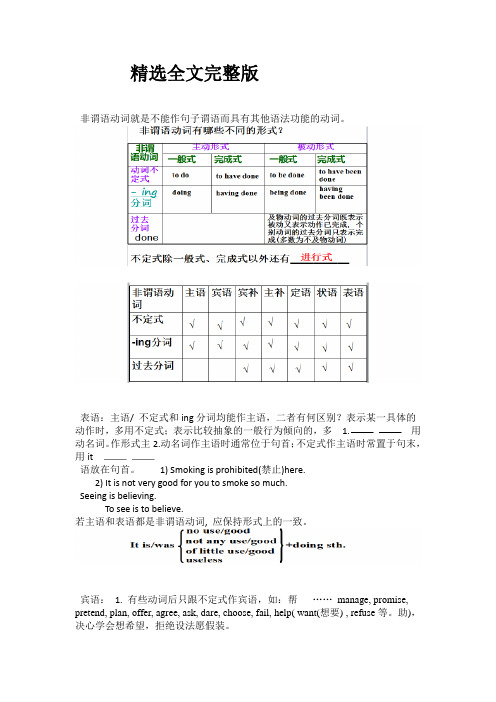
精选全文完整版非谓语动词就是不能作句子谓语而具有其他语法功能的动词。
表语:主语/ 不定式和ing分词均能作主语,二者有何区别?表示某一具体的动作时,多用不定式;表示比较抽象的一般行为倾向的,多 1.用动名词。
作形式主2.动名词作主语时通常位于句首;不定式作主语时常置于句末,用it语放在句首。
1) Smoking is prohibited(禁止)here.2) It is not very good for you to smoke so much.Seeing is believing.To see is to believe.若主语和表语都是非谓语动词, 应保持形式上的一致。
宾语:1. 有些动词后只跟不定式作宾语,如:帮……manage, promise, pretend, plan, offer, agree, ask, dare, choose, fail, help(want(想要) , refuse等。
助),决心学会想希望,拒绝设法愿假装。
主动答应选计划,同意请求帮一帮。
2. 有些动词后只跟动名词作宾语,如:practise, appreciate, dislike, excuse, forgive, keep, resist, risk, deny, advise,fancy, ……complete, forbid, permit, allow, stand, refer to, give up, lead to, take to, set about, getdown to, object to, succeed in, have difficulty in... 考虑建议盼原谅,承认推迟没得想。
避免错过继续练,否认完成就欣赏。
禁止想象才冒险,不禁介意准逃亡。
分后既可以跟不定式又可以跟ing3.有些动词如begin, start; love, like, hate, prefer 不定式表示具分词一般表示经常性的行为;词作宾语,意义上无多大区别(但ing。
非谓语动词的用法归纳

非谓语动词的用法归纳非谓语动词这玩意儿,在英语学习中可真是个让人又爱又恨的“小调皮”。
咱们今天就来好好扒一扒它的用法,把它给彻底整明白!先来说说啥是非谓语动词哈。
简单来讲,就是在句子中不充当谓语的动词形式。
那它有几种形式呢?主要有三种:动词不定式(to do)、动名词(doing)和分词(现在分词 doing 和过去分词 done)。
咱们先瞅瞅动词不定式。
这就好比是一个怀揣着梦想,准备大干一场的“勇士”。
比如说,“I want to go shopping”在这个句子里,“to go shopping”就是动词不定式,它表示“想要去做某事”,有种未来的打算或者愿望在里头。
再比如,“He is too young to go to school”这里的“togo to school”也是动词不定式,用来表示“太……而不能……”。
动名词呢,就像是个勤劳的“小蜜蜂”,一直在忙碌着。
比如说,“Swimming is my favorite sport”这里的“swimming”就是动名词,它在句子中充当主语,表示“游泳这件事”。
还有像“I enjoy reading books” 中的“reading”,充当宾语,表示“阅读这个动作”。
接下来是分词,这可有点复杂啦。
现在分词就像个充满活力的“小精灵”,欢快地跳动着,表示主动和进行的动作。
比如说,“The running boy is my brother” 这里的“running”就是现在分词,作定语修饰“boy”,表示“正在跑的男孩”。
过去分词呢,则像是个有点“委屈”的“小可怜”,表示被动和完成的动作。
比如,“The broken window needs to be repaired” 这里的“broken”就是过去分词,作定语,表示“被打破的窗户”。
给大家讲个我自己的亲身经历吧。
有一次,我在课堂上讲非谓语动词,有个同学一脸懵地看着我,说:“老师,这也太难了,感觉脑袋都要炸了!”我笑着跟他说:“别着急,咱们一点点来,就像啃一块大骨头,慢慢啃总会啃完的。
英语非谓语动词用法总结完整

英语非谓语动词用法总结(完整)一、单项选择非谓语动词1After a decade or so, out of choices, he returned to where he'd begun, ashamed athaving .so little to show for his wanderings.runningbeing run BA..having runCto run D..D【答案】【解析】【详解】考查现在分词。
句意:大约十年后,在没有选择的情况下,他回到了他开始的地方,为自run out of “”he在逻辑上是主动关己的拼搏没有什么收获而感到羞愧。
与主语用光,耗尽returnhaving run ofD。
故系,且表示的动作明显发生在之前,所以用现在分词的完成时选项正确。
【点睛】非谓语动词是考试考查的重点,要掌握它的用法。
首先,要弄清楚填空处要填的是非谓语。
其次,要知道非谓语动词的三种形式:现在分词表示主动进行、过去分词表示被动完成、动词不定式表示目的和将要。
再次,要知道非谓语动作与谓语动作是同时发生还是先后发生,还是将要发生。
其中分词做状语的考查尤为重要。
he,returned, run out of “”与主语用光,耗尽分析句子可知,本句的主语为为非谓语谓语为hereturn的之前,所以用现在分词的完成在逻辑上是主动关系,且表示的动作明显发生在Dhaving run of选项正确。
故时2At the age of 29, Dave was a worker, ________ in a small apartment near Bostonand .__________what to do about his future.lived; wonderingliving; wondering BA..living; wonderedlived; wondered DC..A【答案】【解析】,At the age of 29,D was a worker.所以后面要这是完整句子试题分析:现在分词做伴随状语,. . and,主要注意用现在分词,现在分词的主语就是主句用分词结构显然是两个并列分词有29DAVE岁时是一名工人,的主语,它们之间的关系是主动关系。
高中英语知识点归纳非谓语动词的形式与用法技巧

高中英语知识点归纳非谓语动词的形式与用法技巧高中英语知识点归纳:非谓语动词的形式与用法技巧介绍:非谓语动词是英语语法中一个重要的概念,它可以作为动词的其他形式出现在句子中,除了主要动词之外。
在高中英语学习过程中,掌握非谓语动词的形式与用法技巧对于正确理解和运用英语语法非常重要。
本篇文章将归纳总结非谓语动词的基本形式及其常用的用法技巧,帮助读者更好地掌握这一知识点。
一、非谓语动词的基本形式非谓语动词包括不定式、动名词和现在分词。
它们的形式如下:1. 不定式:to + 动词原形(例如:to go)2. 动名词:动词原形 + -ing(例如:going)3. 现在分词:动词原形 + -ing(例如:going)二、非谓语动词的用法技巧下面将分别介绍不定式、动名词和现在分词的用法技巧。
1. 不定式的用法技巧:(1)作为主语:不定式作为主语时,常用it作形式主语,而将真正的主语放在不定式的后面。
例如:It is important to learn English well.(学好英语很重要。
)(2)作为宾语:动词后接不定式作为宾语时,不定式可以用于表示意图、目的、愿望、能力等。
例如:I want to go shopping.(我想去购物。
)(3)作为状语:不定式可作为状语修饰动词、形容词或副词,常表示目的、结果、原因等。
例如:He ran fast to catch the bus.(他快跑着去赶公共汽车。
)2. 动名词的用法技巧:(1)作为主语:动名词作为主语时,常用单数形式,并与动词以及代词的第三人称单数形式连用。
例如:Swimming is a good sport.(游泳是一项好运动。
)(2)作为宾语:动词后接动名词作宾语时,常与动词不定式有一定的区别,如愿望、计划、避免等。
例如:I enjoy playing basketball.(我喜欢打篮球。
)(3)作为介词宾语:动名词可作为介词的宾语,常见的介词有:for, of, about, with等。
英语非谓语动词用法总结(完整)
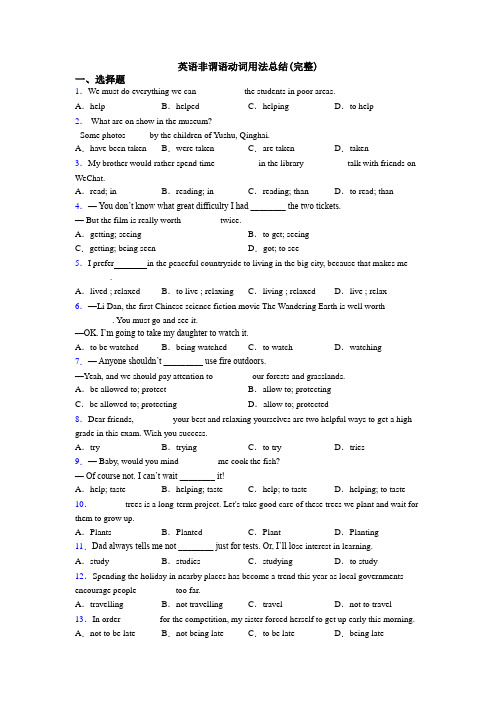
英语非谓语动词用法总结(完整)一、选择题1.We must do everything we can __________ the students in poor areas.A.help B.helped C.helping D.to help2.-What are on show in the museum?-Some photos _____by the children of Yushu, Qinghai.A.have been taken B.were taken C.are taken D.taken3.My brother would rather spend time _________ in the library _________ talk with friends on WeChat.A.read; in B.reading; in C.reading; than D.to read; than 4.—You don’t know what great difficulty I had ________ the two tickets.— But the film is really worth ________ twice.A.getting; seeing B.to get; seeingC.getting; being seen D.got; to see5.I prefer in the peaceful countryside to living in the big city, because that makes me ________.A.lived ; relaxed B.to live ; relaxing C.living ; relaxed D.live ; relax 6.—Li Dan, the first Chinese science fiction movie The Wandering Earth is well worth________ . You must go and see it.—OK. I’m going to take my daughter to watch it.A.to be watched B.being watched C.to watch D.watching 7.—Anyone shouldn’t _________ use fire outdoors.—Yeah, and we should pay attention to ________ our forests and grasslands.A.be allowed to; protect B.allow to; protectingC.be allowed to; protecting D.allow to; protected8.Dear friends, ________ your best and relaxing yourselves are two helpful ways to get a high grade in this exam. Wish you success.A.try B.trying C.to try D.tries9.— Baby, would you mind ________ me cook the fish?—Of course not. I can’t wait ________ it!A.help; taste B.helping; taste C.help; to taste D.helping; to taste 10._______ trees is a long-term project. Let's take good care of these trees we plant and wait for them to grow up.A.Plants B.Planted C.Plant D.Planting11.Dad always tells me not ________ just for tests. Or, I’ll lo se interest in learning.A.study B.studies C.studying D.to study 12.Spending the holiday in nearby places has become a trend this year as local governments encourage people ________ too far.A.travelling B.not travelling C.travel D.not to travel 13.In order ________ for the competition, my sister forced herself to get up early this morning. A.not to be late B.not being late C.to be late D.being late14.We should encourage our students _____ hard instead of ____ too much time playing games. A.work; spend B.to work; spendC.work; spending D.to work; spending15.Online short video apps like Douyin make________easier to do some shopping at home. A.it B.one C.this D.that 16.—What’s your plan for the coming summer holiday?—I’ll devote as much time as I can some v oluntary work.A.to do B.to doing C.do D.doing17.Fans all over the country are talking about ________ this football team has never won any match and ________ to do with it.A.whether; how B.why; how C.whether; what D.why; what18.-How do you feel after watching the movie Amazing, My Country?-Well, I think it is lucky for us ____________ this great country.A.to live B.to live in C.living D.living in 19.—Mother’s Day is coming. Shall we make some paper roses for Mum?—Sounds great! But would you please show me _______ as I know little about DIY? A.where B.why C.whether D.how20.Life is about waiting for the right moment ________, because everyone is in his own TIME ZONE.A.acting B.to act C.act D.acts21.More TV programs, according to government officials, will be produced _____ people’s attention over food safety.A.to raise B.raising C.to rise D.rising22.I was tired out, so I stopped the car a short rest.A.have B.having C.to have D.had23.—I don’t know _____ remember the new English words.—Don’t worry! Try thinking about their pronunciations.A.what to B.how to C.where to D.when to24.–Your robot has caught a virus and it no longer works properly.–Wow, ______ mess it has made! I really don’t know _______ to do with it.A.what, how B.how, how C.what a, what D.how, what 25.My uncle made up his mind to devote his life pollution happily.A.to prevent; to live B.to prevent; from livingC.to preventing; to live D.to preventing; from living26.___________for his good skill, this doctor has a lot of visitors calling for help all the time. A.Knowing B.To know C.Known D.To have known 27.The old couple often take a walk after supper in the park with their pet dog ___________ them.A.to follow B.following C.followed D.follows 28.Mrs. White showed her student some old maps ________from the library.A.to borrow B.to be borrowed C.borrowed D.borrowing 29.—My bike is broken.—Why not have it________?A.repair B.repaired C.repairing D.to repair 30.—Why do the students need to read every day?—________information for writing.A.To collect B.Collecting C.Collect D.Collected 31.—Mum, my computer doesn’t work. It needs_________ .—OK. I will have it _________.A.repairing; repaired B.to repair; repairC.be repaired; repairing D.being repaired; to repair32.What a terrible thing! There is a ________ dog ________ on the ground.A.die, lie B.dead, lying C.death, lay D.dying, lie 33.Seeing their teacher _______ into the classroom, they stopped _______ at once. A.walk; telling B.entering; to speak C.enter; to tell D.walking; talking 34.—What makes you so brave to volunteer in the community?—Because I know that there must be so many people __________ for our support.A.to wait B.wait C.waiting D.waited 35.With a lot of students about too much homework, our teachers have tried some ways to solve this problem.A.complain B.complaining C.complained D.to complain 36.Snakes don’t have ears but they can feel things ________.A.moving B.move C.moved D.to move37.---Is Jack in the next room ?---It’s hard to sa y. But I heard him _____ loudly when I passed by just now.A.speak B.to speak C.spoken D.speaking 38.—What are you talking about?—Some pictures ________ yesterday.A.were taken B.took C.taken D.have been taken 39.—Tom, have you ever read the book A Tale of Two Cities ________ by Charles Dickens?—Yes, I finished reading it last winter vacation.A.wrote B.to write C.writing D.written 40.When I got back home I saw a note on the door ____ “Sorry to miss you; will call later.”A.say B.says C.to say D.saying41.Look! There _______ so many people _________here. Do you know what has happened? A.is, standing B.are, are standing C.are, standing 42.Lily’s parents always encourage her ____out her opinions.A.speak B.speaking C.to speak D.spoken 43.The rubbish ________ every day is becoming a serious problem in cities around the world. A.produce B.produced C.producer D.producing44.--- Have you seen the movie《Lost in Thailand》?--- Yeah, it’s truly worth ________. It’s ________ interesting that I’ve seen it tw ice. A.seeing; too B.to see; enough C.seeing; so D.to see; such45.This food is cooked by a cook _____ Victor.A.call B.calls C.called D.calling 46.Gina is the only girl ______ a coat.A.who wear B.who wearing C.wearing D.wears47.I would rather spend time ______ at home than ______ out with you.A.staying; go B.to stay; to go C.staying; to go D.to stay; go48.—Spring is also the time when the farmers are busy _______ the wheat.—Usually they don’t stop _______ even it’s lunchtime.A.growing; working B.growing; to work C.grow, to work D.grow; working 49.People are advised to avoid ________ their eyes, nose, and mouth with unwashed hands. A.touch B.touched C.to touch D.touching 50.Paul is really considering________himself to________ those children in the earthquake-hit area.A.to devote, teaching B.devoting, teaching C.devoting, teach D.to devote, teach 51.—I prefer ________ with a pen to ________ on the computer, because I type so slowly. —So do I.A.write; typing B.to write; to type C.writing; to type D.writing; typing 52.These young trees will require ________carefully.A.to look after B.being looked after C.having looked after D. looking after 53.Huawei has succeeded in ________new software for his products. I can’t wait ________a new Huawei mobile.A.developing, to buy B.developed, buying C.developing, buy D.develop, buying 54.—How much do you know "996" schedule?—Well, it means _____________from 9 am to 9 pm, six days a week.A.working B.worked C.to work D.works 55.When you travel abroad, you can hardly avoid products made in China.A.to buy B.buy C.buying D.be bought56.A new high-speed railway ________ Yangzhou ________ Nanjing will be built. A.connected; and B.connects; with C.connected; to D.connecting; to 57.I like because it makes us know ourselves better and know more about the world. A.reading B.cooking C.swimming D.dancing58.The girl is often seen ____in the art room.A.practice drawing B.practised drawingC.to practice drawing D.practice to draw59.--Would you mind basketball here? I'm writing a report.--Sorry. We'll go and play it on the playground.A.playing B.not playing C.to play D.not to play60.If you want to make yourself ______, you should speak clearly and slowly.A.to understand B.understood C.understand D.understanding 【参考答案】一、选择题1.D解析:D【详解】句意:我们必须尽我们所能来帮助贫困地区的学生。
(完整版)非谓语动词用法归纳(语法)

一、表格的用法1.doing 的用法(1)在要求动词后(作宾语):avoid避免appreciate 感激/欣赏acknowledge承认/自认admit 承认advocate 提倡/主张consider 考虑can't help不禁can't stand受不了contemplate细想complete完成confess坦白dislike 不喜欢,讨厌deserve值得delay延迟deny否认dread可怕defer拖延detest嫌恶enjoy享有/喜爱envy嫉妒endure忍受excuse借口escape逃跑/逃避finish完成forgive原谅fancy幻想/爱好favor 造成/偏爱figure描绘/计算hate讨厌imagine设想involve卷入/包含keep保持miss错过mention说到/讲到mind 介意pardon原谅/饶恕permit允许postpone推迟practice 实行/实践prevent阻止quit放弃停止risk冒险recall回想resist抵抗/阻止resume恢复repent悔悟resent怨恨stand坚持/忍受suggest建议save营救/储蓄tolerate忍受worth值得You should try to avoid making mistakes.The book is worth reading.The book deserves reading.(2)表进行Walking on the grassland, I saw a snake.=When I was walking on the grassland, I saw a snake.The man speaking English is Tom. = The man who is speaking English is Tom.(3)表主动The man speaking English is Tom = The man who speaks English is Tom.= The man who spoke English is Tom.Nobody dinks boiling water but boiled water.= Nobody dinks water that is boiling but the water that has boiled. (4)表伴随I stand outside waiting for Mr. Chen.I lie in bed reading a novel.(5)表性质;特点The film is very moving.She is understanding, so you had better discuss your business with her.(6)概括性,一般性Climbing mountain is very interesting.Driving a car during the rush hour is tiring.在高峰时刻开车令人厌烦。
高中英语知识点归纳非谓语动词的种类与用法

高中英语知识点归纳非谓语动词的种类与用法非谓语动词是指不能独立构成句子谓语的动词形式,主要包括动词不定式、动名词和分词。
非谓语动词在英语中具有广泛的应用,本文将对非谓语动词的种类与用法进行归纳总结。
一、动词不定式(Infinitive)动词不定式由"to + 动词原形"构成,可以作主语、宾语、表语、定语以及状语等。
下面分别介绍它们的用法。
1. 动词不定式作主语动词不定式作主语时,常放在句首,例如:"To err is human." (犯错误是人之常情。
)"To learn a foreign language is not easy." (学习外语并不容易。
)2. 动词不定式作宾语动词不定式作及物动词的宾语时,常放在及物动词之后,例如:"She wants to become a doctor." (她想成为一名医生。
)"I forgot to bring my umbrella." (我忘记带伞了。
)3. 动词不定式作表语动词不定式作表语时,常与系动词连接,例如:"His dream is to travel around the world." (他的梦想是周游世界。
)"My goal is to win the championship." (我的目标是赢得冠军。
)4. 动词不定式作定语动词不定式作定语时,常位于被修饰名词之后,例如:"The best way to learn English is to practice more." (学英语的最佳途径是多加练习。
)"I need a pen to write my essay." (我需要一支笔来写我的文章。
)5. 动词不定式作状语动词不定式作状语时,可以表示目的、结果、原因、条件等,例如:"I study hard to pass the exam." (我努力学习为了通过考试。
英语非谓语动词用法全面归纳

英语非谓语动词用法全面归纳非谓语动词的分类非谓语动词在句子中可以担任六种不同的成分,分别是主语、宾语、定语、状语、补语和表语。
下面根据它们在句子中的不同作用进行分类。
1.主语1)doing:表示抽象的、规律性的、延续性的动作,常用于被动语态中的being done。
例如:XXX.(阅读需要耐心和毅力。
)2)to do:表示具体的、一次性的、短暂性的动作,常用于被动语态中的to be done。
例如:To have a walk along the river after supper is such fun.(晚饭后沿着河边散步真是太有趣了。
)3)注意:①to do经常用it作形式主语替代逻辑主语放在句首,而真正的逻辑主语放在句末。
一般形式有:a。
it’s + adj + to do sth;b。
it + vt + o(宾语) + to do sth。
例如:It’s important to have a good eyesight。
as it’s known to us.(拥有良好的视力很重要,这是我们所知道的。
)It took me 3 days to finish the task.(我用了三天时间完成了这个任务。
)②it作形式主语替代doing的几个结构,如:it’s nouse/useless,it’s a waste of time,it’s no good等。
例如:It’XXX.(覆水难收。
)③范例:1)To the sun for too long contributes to the harm to the skin.A。
Being exposedB。
ExposedXXXD。
XXX解析:选A。
有可能误选B,因为可能误认为句子缺少状语,但实际上这个短语作为状语的话,句子就没有主语了。
正确的判断方法是划分句子的主谓宾。
2)动名词的复合结构:one’s doing/being done。
(完整版)非谓语的用法总结

(完整版)⾮谓语的⽤法总结⾮谓语动词的⽤法总结李靖⾮谓语动词(不定式、动名词、分词)不是真正意义上的谓语动词,在句中都不能单独作谓语。
但都具有动词的某些特点,可以有⾃⼰的宾语或状语,构成⾮谓语动词短语。
不定式表⽬的,表将来;动名词表主动,表进⾏;过去分词表被动,表完成。
⼀.作主语( 动名词、不定式、过去分词前⾯加being, 动名词做主语谓语动词⽤单数)1)不定式、动名词都可做主语,但是动名词做主语多指抽象的概念性的动作,可以是多次的经常的⾏为;不定式多表⽰具体的动作,尤其是某⼀次的动作。
如:Playing with fire is dangerous. 玩⽕危险。
(泛指玩⽕)To play with fire will be dangerous. 玩⽕会发⽣危险。
2)⽤动名词做主语的句型:It’s no use/no good/pleasure doing sth 做.......没有⽤处/好处/乐趣It’s a waste of time doing sth 做.... 浪费时间It is worth doing sth 值得做某事It is no use crying over spilt milk. 覆⽔难收It is worth making an appointment before you go. 去之前预约⼀下是值得的。
3)不定式做主语的句型.It is + adj +for sb to do sth.⽐较:表⽰⼈的品质时只能⽤of sb 如considerate/kind/nice/foolish/stupid/rude/cruel/wise/clever/brave/selfish/crazy/good/careful/careless/impolite/right/wrong等单词出现时。
It is silly of you to say so.It is important for us to learn English well.It is a must/ a necessity for us to have a good command of the English language.4) “Wh- + to 不定式”可做主语。
非谓语动词知识点总结

非谓语动词知识点总结非谓语动词是指在句子中不作谓语的动词形式,包括不定式、动名词和分词。
它们具有多种用法和功能,下面将对非谓语动词的知识点进行总结。
一、不定式1. 不定式的形式:以to+动词原形构成,如to eat、to go等。
2. 不定式作主语:To learn English is important.3. 不定式作宾语:I want to eat an apple.4. 不定式作表语:My dream is to become a doctor.5. 不定式作定语:I have a book to read.6. 不定式作状语:She woke up early to catch the train.二、动名词1. 动名词的形式:动词+ing形式,如eating、going等。
2. 动名词作主语:Swimming is good for health.3. 动名词作宾语:I enjoy playing basketball.4. 动名词作表语:His hobby is fishing.5. 动名词作定语:I have a writing task to finish.6. 动名词作状语:He left without saying goodbye.三、分词1. 分词的形式:分为现在分词和过去分词两种形式,如working、played等。
2. 现在分词作主语:Reading helps improve vocabulary.3. 现在分词作宾语:She heard someone calling her name.4. 现在分词作表语:He is a hardworking student.5. 现在分词作定语:I saw a running dog in the park.6. 现在分词作状语:He left the room, closing the door behind him.7. 过去分词作宾语补足语:I found the door closed.四、非谓语动词的逻辑主语1. 不定式的逻辑主语:It is important to learn English.2. 动名词的逻辑主语:Swimming helps improve health.3. 分词的逻辑主语:Reading books is beneficial for children.五、非谓语动词的否定形式1. 不定式的否定形式:not+不定式,如not to go、not to eat等。
英语 非谓语动词 用法 讲解 知识点总结 完整版 最全 归纳 专项

非谓语动词定义不做句子的谓语,而是充当其他语法功能的动词叫做非谓语动词。
分为三种:不定式(Infinitive),分词(Participles),动名词(Gerund)。
一、非谓语动词和谓语动词的区别谓语动词的作用明确而单一,非谓语动词的作用丰富:1.非谓语动词作名词词性(不定式和动名词)Your duty is to look after the children. 你的工作是照看好孩子。
Complaining is no use. 抱怨是没有用的。
2. 非谓语动词做形容词词性(分词、不定式和动名词)The vase is broken. 那个花瓶破了。
He is a nice person to work with. 他是一个很好共事的人。
We found the story amusing. 我们发现这个故事很有意思。
3. 非谓语动词做副词词性(不定式和分词)They are working hard to win still greater victory. 他们在努力工作争取更大的胜利。
The sick man came in, supported by two nurses.二、非谓语动词的用法A 不定式(to do)在非谓语动词中,不定式的用法最广泛。
它在句中可作主语、宾语、表语、定语、状语和主语补足语或宾语补足语。
也就是说,不定式可以充当除谓语以外的所有成分。
1. 做主语To say something is one thing, to do it is another. 说是一码事,干是另一码事。
* 注:形式主语it,当不定式做主语时,特别是当主语较长而谓语较短时,常用“it”作形式主语,而把真正的主语放在谓语的后面。
此种用法在日常英语中尤为常见。
It is not fair to blame them for the accident. 把这次事故归咎于他们是不公平的。
但是,当主语和表语都是不定式时,不能用形式主语代替动词不定式。
非谓语动词用法详解

非谓语动词用法详解动词的非谓语形式有三种:不定式、动名词和分词(一)不定式不定式由“to十动词原形”构成,其否定形式是“not to do”.不定式可以带宾语或状语构成不定式短语,没有人称和数的变化,但有时态和语态的变化.不定式可作主语、宾语、状语、表语和定语,但不能单独作谓语.不定式的逻辑主语有时用“for十名词或代词宾格”构成.1.不定式的用法:l)作主语.不定式短语作主语时,往往放在谓语之后,用it作形式主语.例如:To see is to believe.It is right to give up smoking.2)作宾语.不定式短语作宾语时,如果还带有宾语补足语。
往往把不定式宾语放在宾语补足语之后,而用it作形式宾语.例如:He wanted to go.I find it interesting to study work with him.3)作宾语补足语.例如:He asked me to do the work with him.注意:在feel,hear,listen to,look at,notice, observe,see,watch,have, let,make等词后的补足语中,不定式不带to.但是这些句子如果变成被动结构时,就必须带to.例如I often hear him sing the song.He is often heard to sing the song.注意:不定式动词在介词but,except,besides后面时,如果这些介词之前有行为动词do的各种形式,那么,这些介词后的不定式不带to,否则要带to.如:She could do nothing but cry.What do you like to do besides swim?I have no choice but to go.动词help之后,带to或不带to都可以。
Will you please help me (to) take this suitcase? 请你帮我提一下这个衣箱好吗?She often helps her mother (to) clean their house. 她经常帮助她妈妈打扫房子。
非谓语动词用法总结大全
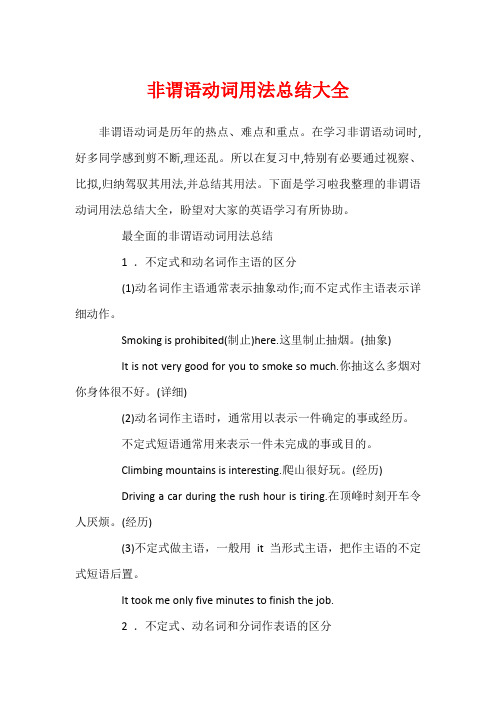
非谓语动词用法总结大全非谓语动词是历年的热点、难点和重点。
在学习非谓语动词时,好多同学感到剪不断,理还乱。
所以在复习中,特别有必要通过视察、比拟,归纳驾驭其用法,并总结其用法。
下面是学习啦我整理的非谓语动词用法总结大全,盼望对大家的英语学习有所协助。
最全面的非谓语动词用法总结1 .不定式和动名词作主语的区分(1)动名词作主语通常表示抽象动作;而不定式作主语表示详细动作。
Smoking is prohibited(制止)here.这里制止抽烟。
(抽象)It is not very good for you to smoke so much.你抽这么多烟对你身体很不好。
(详细)(2)动名词作主语时,通常用以表示一件确定的事或经历。
不定式短语通常用来表示一件未完成的事或目的。
Climbing mountains is interesting.爬山很好玩。
(经历)Driving a car during the rush hour is tiring.在顶峰时刻开车令人厌烦。
(经历)(3)不定式做主语,一般用it当形式主语,把作主语的不定式短语后置。
It took me only five minutes to finish the job.2 .不定式、动名词和分词作表语的区分(1)不定式作表语1)不定式作表语一般表示详细动作,特殊是表示将来的动作。
To do two things at a time is to do neither.--次做两件事等于未做。
What I would suggest is to start work at once.我的建议是马上起先干。
2)假如主语是不定式(表示条件),表语也是不定式(表示结果)。
To see is to believe.百闻不如一见。
To work means to earn a living.工作就是为了生活。
3)假如主语是以aim,duty,hope,idea,happiness,job,plan,problem,purpose,thing,wish等为中心的名词,或以what 引导的名词性从句,不定式作表语是对主语起补充说明作用。
非谓语动词用法归纳(非常齐全)
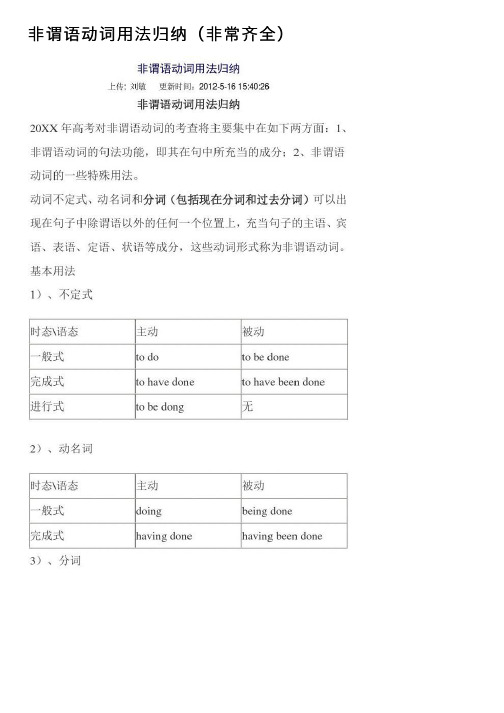
⾮谓语动词⽤法归纳(⾮常齐全)it is / was no use / good + doing sth.it is / was not any use / good + doing sth.it is / was of little use / good + doing sth.it is / was useless doing sth.it is no use crying over spilt milk. 覆⽔难收。
it is of little good staying up too late every day.每天都熬夜没有什么好处2.不定式和动名词作宾语的区别英语中⼤多数动词既可跟不定式,也可跟动名词作直接宾语,但有些动词要求:(1)不定式做宾语和宾语补⾜语1)下⾯的动词要求不定式做宾语afford, agree, arrange, choose, decide, hope, expect, offer, plan, promise, determine, demand, manage, fail, prepare, refuse, pretend, seem常跟不定式作宾语的动词歌诀:三个希望两答应,两个要求莫拒绝, 设法学会做决定,不要假装在选择。
hope; wish; want ; agree;promise demand; ask; refuse manage; learn; decidepretend ; choose想要拒绝命令,需要努⼒学习,期望同意帮助,希望决定开始。
want ; refuse ; order need; try ; learn expect ; agree ; help hope ; wish ; decide ; begin ;start2)下⾯的动词要求不定式做宾补:动词+宾语+动词不定式ask要求,邀请get请,得到prompt促使allow允许forbid禁⽌prefer喜欢,宁愿announce宣布force强迫press迫使bride 收买inspire⿎舞request请求assist协助hate憎恶pronounce断定,表⽰advise劝告exhort告诫,勉励pray请求authorize授权,委托help帮助recommend劝告,推荐bear容忍implore恳求remind提醒beg请求induce引诱report报告compel强迫invite吸引,邀请,summon传唤command命令intend想要,企图show 显⽰drive驱赶mean意欲,打算train训练cause引起instruct指⽰require要求deserve应受leave使,让tell告诉direct指导like喜欢tempt劝诱entitle有资格order命令warn告诫enable使能够need需要urge激励,⼒说encourage⿎励oblige不得不want想要condemn指责,谴责lead引起,使得teach教entreat恳求permit允许wish希望(2)有少数动词只能⽤动名词作宾语admit, advise, allow, appreciate, avoid, complete, consider, delay, deny, enjoy, escape, finish, imagine, keep, mind, miss,practise, suggest, stop, can’t stand, can’t help, be worth常跟动词ing作宾语的动词歌诀:考虑建议盼原谅,承认推迟没得想,避免错过继续练,否认完成停能赏,不禁介意准逃亡,不准冒险凭想象。
- 1、下载文档前请自行甄别文档内容的完整性,平台不提供额外的编辑、内容补充、找答案等附加服务。
- 2、"仅部分预览"的文档,不可在线预览部分如存在完整性等问题,可反馈申请退款(可完整预览的文档不适用该条件!)。
- 3、如文档侵犯您的权益,请联系客服反馈,我们会尽快为您处理(人工客服工作时间:9:00-18:30)。
非谓语动词归纳非谓语动词在句子中可以作主语,宾语,定语,状语,补语和表语六种。
现根据在句子中的成分不同把它们归纳成六类。
一.主语1.doing;主动的,抽象的,规律性的,一般的,延续性的动作,其被动态being done2.to do;主动,具体的,一次性的,短暂性的,尚未发生的动作,其被动态t o be doneEg; Reading calls for patience and perseverance.To have a walk along the river after supper is such fun.3.注意;①to do 经常用it作形式主语替代逻辑主语放在句首,而真正的逻辑主语放在句末。
其一般形式有a.it’s +adj+to do sth b.it +vt +o(宾语)+ to do sth。
Eg; It’s important to have a good eye sight ,as it’s known to us .It took me 3 days to finish the task.②it作形式主语替代doing的几个结构;it’s no use/useless .it’s waste of time .it’s no good 等。
Eg; It’s no use crying over the spilt milk.覆水难收③范例;(1) to the sun for too long contributes to the harm to the skin.A .Being exposed B.Exposed C.Having exposed D.To exposed解析;选A。
可能误选B。
误认句子缺少状语,但观察可以发现若是作状语的话,那么句子就没有主语了。
判断方法;划分句子的主谓宾。
3.动名词的复合结构;one’s doing /being doneEg.My sister’s being ill made us all worried =That my sister was ill made us all worried.4.迁移;若主语与to do中的do 存在动宾关系,且形容词是hard. difficult 之类的,那么do用主动态表示被动态。
Eg ;The question is hard to answer.二.宾语1.总结;doing;长期性的动作,其他的同上,被动态为being done。
to do ;短暂性的,已完成的动作,其他的同上,被动态为to be done。
2.,几种类型;①大部分动词+to do②只加doing的;imagine.avoid.mistake.delay.deny.risk.mind.appreciate.escape等。
③既可以加doing又可以加to do的,但意思不同的;regret remember forget admit等(这些动词后面也可以加having done,其意思和加doing的时候一样)④加doingd的时候表被动;need want require 等,这种情况下句子的主语一般是物。
⑤一般情况下两者可以互换但某些情况下不能;start/begin,like/enjoy/love 等,前者在句子主语是物的时候只能用to do(当然这只是其中一种情况了,还有其他的注意点),而后者加to do时表示暂时的兴趣,而表示doing长久的兴趣.Eg;I like swimming,and I enjoy to run these days.(我一直都很喜欢游泳,但是我这段时间又喜欢跑步了,后者是暂时的兴趣,将来是否还喜欢就不知道了)3.动名词的复合结构;①vt + one’s doing(mind,imagine,find等),另外这类动词还可以将one’s改成宾语,即doing变成了宾补了②介词+one’s doing/o+doingEg;Would you mind my/me opening the window?The sound of the desks/desks’being knocked can be heard from the street in usual days,but strangely I can’t heard it!③there to do/doingEg; I prefer(宁愿) there to be no persons present today,I feel so nervous to speak in front of so many people.4.不定式/动名词的完成式;表示宾语的动作先于谓语的动作发生,形式为to have done/ to have been done,having done/having been done。
Eg;Yesterday when the Smiths come to vist us,we happened to have go out.(出去这个动作是发生在拜访之前的)* 注意;下列动词的不定式的完成式表示虚拟,表示原打算做的动作却没有发生的plan/ intend /prefer/mean(打算)/be to=had done+to do等Eg;We intended to have gone to the concert,but the heavy rain hold us off.5.it 作形式宾语;find /make/think等+it +to do sthEg; I think it useful to master computer technology.6.不定式的进行式:to be doing,表示宾语的动作与谓语同时发生。
Eg:When the teacher came in , Jhon pretended to be reading.三.定语(分为前置定语和后置定语)1..①doing;主动的,正在进行的,表功用,长期,延续的,一般性的动作Eg; the walking stick(表功用) the man sitting at the table(正在进行的)②being done;被动的,其他的同上Eg;The issue being discussed at the meeting becomes a hot topic in the company.③to do;主动的,尚未发生的,解释所修饰的名词,具体的动作Eg; The person to speak in the class tonight set off everyone’s curiosity.His attempt to escape from the prison failed again.④done;被动态,表示已完成,或规律性的动作Eg;a fallen leafThe flowers sent to teachers on Sep.10th every year are always sold out very early.2.注意①所修饰名词与定语存在动宾关系式,若定语中do是不及物动词的话,那么要在它的背后不上介词,但是若所修饰名词为space,room,nature时则不能加介词。
Eg;Please give me a pen to write in.There’s no space for me to stand.四.状语(一)分词作状语①doing;主动,状语与主句的动作同时发生或前后间隔的时间很短,一般性的动作,否定形式是not doinEg;Hearing the cry for help,he rushed out to see what had happened.②having done;主动,状语的动作先于主句发生,一般性,延续性动作,否定形式是nothaving done.③having been done;被动,可与done互换④done;已完成⑤being done;表原因,且done多为表示心理状态的动词Eg;Being excited ,he burst into laughter.但要注意,若句子中直接出现done的话,且表示了主语的心理状态,且与主句的动作伴随发生,那么它不是伴随状语,而是主补Eg;Excited and surprised, he stood up in other guests’ applause,(他站起来的时候是既兴奋又惊讶的,而不是因为惊讶和兴奋而站起来的)⑥to do ;目的状语,与only连用时表示意想不到的结果,尚未发生的动作(doing是表示意料之中的结果)Eg;He rushed to the station ,only to find the train had gone.He was lost in his work, only stopping to have a drink.2.独立主格结构(与分词连用)①规律;状语和主句的主语不同,在状语前补上自己的逻辑主语。
Eg:Mike having cheated in the exam,the teacher felt angry with him.②几种特殊结构;(1)it being(这里的it的用法为它的模糊功能,如指代天气等)(2 )there being /to be(3)with+ o+oc(doing /to do /being done /to be done /介词/adv/adj/n)(4)主动表被动Eg:It being sunny,we went out for a picnic.(it指代天气)There being no bus, we had to walk home.The teacher came into the classroom,(with a) book in (his) hand.Weather permitting,we will go hiking.3.注意;①被动形式但是表示的是主动的意思的词组:be located in ,be seated in/at,be devoted to,be lost /absorbed in,be occupied with,be charged with,be accused of, be supposed to等。
Eg:Devoted/Devoting himself to the medicine ,Doctor Henry has struggled for the career for his whole life.②与连词的省略结构区别和联系,后者的用法和分词作状语及独立主格结构相似,不同的是后者没有having done和having been done结构。
